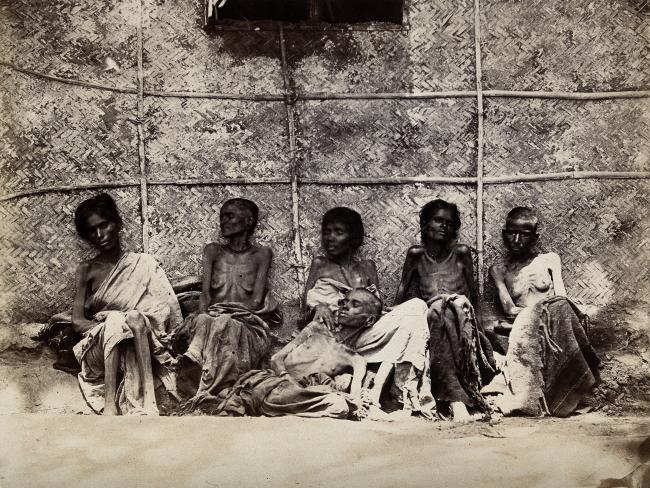
Mysore, India 1876/1878; the Great Famine affected South and South West India. Photo Wellcome Collection via Wikimedia Commons (CC BY 4.0)
Britain’s economy is the key to understanding its foreign policy, as a new book magnificently describes: leading to 140 years of devastating interventions…
British Foreign Policy since 1870, Will Podmore, paperback, 414 pages, ISBN 978-1-4363-4670-2, Xlibris, 2008.
A consistently malign force in international affairs – that’s the verdict of this magnificent historical survey of British foreign policy since 1870.
British governments have unerringly interfered to keep down workers and nations intent on improving their lot in order to preserve the earth as a paradise for ruling class pillage, looting and exploitation.
British workers have their own reasons, becoming ever more apparent, why a revolution is necessary to address a growing number of domestic economic, political and social crises that endanger the survival of our class and nation. But reading Will Podmore’s book we can see the telling evidence of how a revolution is just as desperately needed to remove – once and for all – our rulers as the crucial pillar and driving force of reaction internationally.
Sweep of history
This is a compelling sweep of history covering every part of the globe where the British ruling class sought to control events. All aspects of British foreign policy from the days of empire to recent times come under relentless scrutiny and are examined with sharp insight that is free of jargon and written in a pithy, well-honed style. The book’s overarching theme is that Britain’s economy is the key to understanding its foreign policy. But the pleasure is just as much in the detail.
The material is grouped into 12 historical eras and the impact of our country’s foreign policy on countries and areas is revisited time and time again, revealing in practical terms how it has distorted and crippled the development of huge parts of the world. Therefore, the reader becomes privy to 140 years of unceasing, devastating interventions.
Indictment
The book is a very powerful record and indictment of our rulers throughout the ages, not only in the 250 pages of historical comment but also in the 113 pages of Endnotes that are a delight in themselves, constantly suggesting other leads to lines of enquiry and containing countless interesting nuggets of information that linger in the mind.
This review will present a few early and late glimpses of the work as temptation to wander through the whole endeavour.
The book immediately roots the empire firmly in context: “The British Empire’s pioneer industrial supremacy was the basis of this pioneer imperial supremacy.”
‘The empire harmed the development of the British economy.’
It goes on to outline and produce evidence to illustrate that the empire warped and harmed the development of the British economy. “British investors increasingly put their money into ventures overseas, rather than into expanding production in Britain, seeking the bigger profits gained abroad from cheaper labour power. The shift in emphasis from manufacturing to overseas investment cut back Britain’s industrial lead.”
Not only did Empire set our industrial economy back, it also stopped development elsewhere. “Britain, first to industrialise and first into decline and obsolescence, could grab huge regular profits for investors from her Empire (although the living standards of the people did not derive from Empire but from their work in industry). Her political and economic control over her colonies enabled her to strangle potential rivals’ moves to develop independence and industry (as in Ireland, Egypt and India).”
An early section lists the facts and figures of the Opium Trade between India and China which was controlled and organised by the British ruling class: “the most long-continued and systematic crime of modern times.”
Degradation
The scale of this trade from 1800 to the late 1930s expressed in stark figures conveys the enormity of the degradation imposed on two great countries. The book shows the extent of misrule in India and one particular example is quite horrifying.
Throughout the 19th century the rule of Empire produced a series of awful famines with increasing regularity, and British officialdom responded with policies of minimal intervention, citing what it called the sanctity of free trade and avoidance of dependency.
George Curzon, India’s Viceroy, said, “Any government, which by indiscriminate alms-giving, weakened the fibre and demoralised the self-reliance of the population would be guilty of a public crime.” In a single devastating famine in Bombay in 1877, 5.25 million people died.
Sovereignity
Later sections of the book look at the question of British sovereignty under attack from the EU. The economic imperative of British capital has remained supreme: “Britain’s rulers have always had an external orientation. Their companies invested more overseas than any other country’s firms, relative to GDP.”
It analyses the direction of the EU project and its proposed constitutional treaty. “A consistent policy ran through the Treaty: free movement of capital. It applied no restraints on complete foreign ownership of any public or private institutions, not even the defence or energy industries. The Treaty stipulated the privatisation of coal, rail and post.” In short, “It became increasingly clear that the EU threatened Britain’s ability to run its own affairs.”
• A different illustration, no longer available, was used in the printed version of this review.
